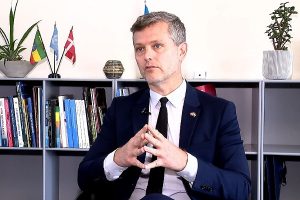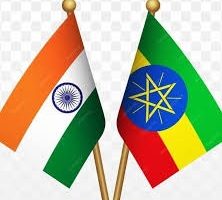
There has been in the past weeks in Addis the Diplomacy Week Exhibition shown at the Science Museum where Ethiopia’s diplomatic history has been revealed in detail. No wonder Ethiopia’s more than one hundred years of intense diplomacy has been exhibited and has gained the admiration and surprise of many visitors who did not know a lot about how much Ethiopia’s diplomatic journey was full of shining successes and memorable achievements. It is well known that Ethiopia has always been a free country having resisted multiple times foreign invasions to colonize it thanks to the prowess of its patriots and the good diplomatic relations it has maintained along the long past years.
Ethiopia’s diplomatic history has not been limited by ideological divergences as it has enjoyed excellent relations with both the so called West and East and the role it played in the formation of the Non Aligned Countries Movement is well known by the relevant countries. Its active participation in the world of diplomacy beginning with the formation of the League of Nations in the early nineteen twenties to the foundation of its successor the United Nations Organisation is a witness to its diplomatic successes and its acceptance as a sovereign nation when there were practically all African states under colonial domination.
Ethiopia’s contribution for the struggle for the liberation of Africa and its relentless campaign of opposition to the apartheid regime of South Africa by trying to isolate it from every international forum where Africans participated is well documented in history books because Ethiopia has gone to the extent of training freedom fighters such as the South African first democratically elected President Nelson Mandela and others such as Samora Machel, Robert Mugabe and others who fought for the liberation of their peoples. Ethiopia’s role in peacekeeping and peacemaking, its contribution of troops to the efforts of the UN to avert escalations of wars and conflicts beginning with the Korean War in the early 1950s and the crisis in Congo with the Katanga War in 1960 have been repeatedly acknowledged and deserved awards and recognitions in the international sphere. Ethiopia has also deserved the reputation as a peace loving country not being involved in any transgressions of international law.
Later on in the foundation of the Organization of African Unity now African Union the role of the then Ethiopian monarch Haile Selassie and his foreign minister Ketema Yifru is unforgettable because it has been recorded in history books and the new generation of Africans can find those stories at the current diplomacy exhibition and the books written on these stories by the Ministry of Foreign Affairs.
The more recent participation of Ethiopian troops in multiple peace keeping missions in countries such as Liberia, Rwanda, Somalia, Sudan and other places under the auspices of both the UN and the AU has been awarded accolades of recognition and admiration given their impeccable performance of their duties with no allegations of scandals as certain peace keeping missions were riddled with. Hence, Ethiopia’s diplomatic clouts are strong and its voice is often heard especially at the African level and this has also resulted in the placing of the seat of the AU and several other international bodies in Addis where presidents, heads of state as well as other conference participants come very comfortably given the reputation Ethiopia has built up across the years with impeccable preparations and successful completion of the summits. The same will be true of the upcoming 37th African Leaders Summit to be held from February 17-18, 2024 preceded by the 44th Ordinary Session of the Executive Council of the African Union on February 14 and 15.
Ethiopians know that every year around the end of January and beginning of February the AU summit is held in their capital and are ready to host its guests warmly, giving them maximum comfort in their movements in the city by freeing them from the intense traffic congestion and preparing the necessary hospitality in all the five star and four star hotels.
Addis Ababa these days is full of wonderful hotels thanks to the recent constructions that are complete and to a hospitality work force that is well trained and experienced. Its security is at its maximum and the tourist attractions that have been recently inaugurated will give more options for not only diplomats but also journalists and other delegation members to indulge in some leisure by visiting these new wonderful nature friendly resorts not very distant from the capital. Even in Addis itself there are several tourist attractions suitable to be visited in a short period of time.
The relevant Ethiopian authorities have given statements to the media that all preparations are finished from every point of view arranged by specialized committees who have been working day and night on this imminent AU summit where Ethiopia will once again be on the limelight of the international media. It will also be a wonderful occasion for the country to dismiss certain allegations that Ethiopia is not stable or that it should not be allowed to prepare such huge international events. The exhibition on Ethiopian diplomatic history and its successes is another demonstration of the position Ethiopia has not only in African history but also in the world at large. The number of days in which the exhibition was to stay open has been extended for more days and it will coincide as well with the upcoming continental conferences.
The history and legacy of Ethiopian diplomacy will have another opportunity to be well publicized among a wide African audience and international journalists as well. Spokesperson of the Ethiopian Ministry of Foreign Affairs Ambassador Meles Alem has said that the Diplomacy Week Exhibition, which was scheduled to be held from January 11 to February 2, 2024, has been rescheduled until the 37th African Union Summit also because of the expressed desire of the diplomatic community in Addis Ababa to extend its duration.
The Spokesperson said that the extension of the exhibition will give ample opportunity to our African brothers and sisters who will be participating at the upcoming 37th Summit of African Heads of States and Governments to visit the Exhibition, given that Ethiopia is the trailblazer of the Pan-African movement.
This decision aligns with the actual initiatives being taken to strengthen Addis Ababa’s position as the diplomatic capital of Africa. During the Diplomacy Week Exhibition, Africans will have the opportunity to see with their own eyes, that Ethiopia is the pillar of Pan-African movement, not only in words, but also in the practical works it has carried out across a number of decades.
Ethiopian Diplomacy Week has been a success in that it was visited by thousands of people who had the opportunity to be well informed about Ethiopia’s diplomatic journey along the decades spanning more than a century. The exhibition was also made to last more days after requests by the diplomatic community and by producing it has been made to coincide with the upcoming AU summit.
Meanwhile, the 37th African Heads of State will present another opportunity for Ethiopian diplomats to engage with various African and other diplomats and explain its stance on many policy issues of Ethiopia such as the recently signed MoU between Ethiopia and Somaliland and explain how Ethiopia does not have any intention of encroaching on the sovereignty of Somalia. Ethiopia will also have the opportunity to elaborate on its stance regarding the GERD negotiations with Egypt and Sudan.
It is known that there are still unresolved details regarding the way the water should be released from the GERD. Ethiopia has repeatedly argued that it won’t sign any pact that would reduce or damage its full rights on the legitimate and reasonable use of the Nile water and not be pushed by Egypt or Sudan or any other force for that matter, to sign an agreement that would affect its sovereign rights on the Grand Ethiopian Renaissance Dam, GERD. It has always sustained that it is ready to negotiate based on international law and practice and the Declaration of Principles signed by the three states some years ago. It is also ready to negotiate based on the practice and regime of transbounday rivers and anything more cannot be acceptable.
Similarly, Ethiopia’s agreement is not intended to harm the interests of any nation by the right of Ethiopia as a landlocked country to seek easy access to the sea in a give and take diplomatic move. At the AU summit Ethiopia will have the occasion to present its case to the international community and defend its policy because there is an international arrangement whereby landlocked countries can claim a right to seek and obtain access to sea so that it can develop its economy and help its people attain decent life. Allegations that Ethiopia is destabilizing the Horn of Africa are unacceptable. They are presumably pushed by Ethiopia’s rivals who have their own strategic geopolitical interests. Ethiopia believes that its growth and development will be a stimulus to neighbouring countries as well as in the long run to Africa as a whole. The Agenda 2063 that projects the eventual union of Africa begins with similar diplomatic moves and the recent MoU signed between Ethiopia and Somaliland can be seen as one brick in that project.
Ethiopia’s history and reputation do not show any record of infringement of the sovereign rights of other nations. Rather it has always been trying to resolve African disputes by presenting its good offices. The above stated exhibition shows clearly the various exploits in which Ethiopia engaged its good move to help resolve issues between neighbours and cases of civil wars in many African countries.
BY FITSUM GETACHEW
THE ETHIOPIAN HERALD TUESDAY 6 FEBRUARY 2024




